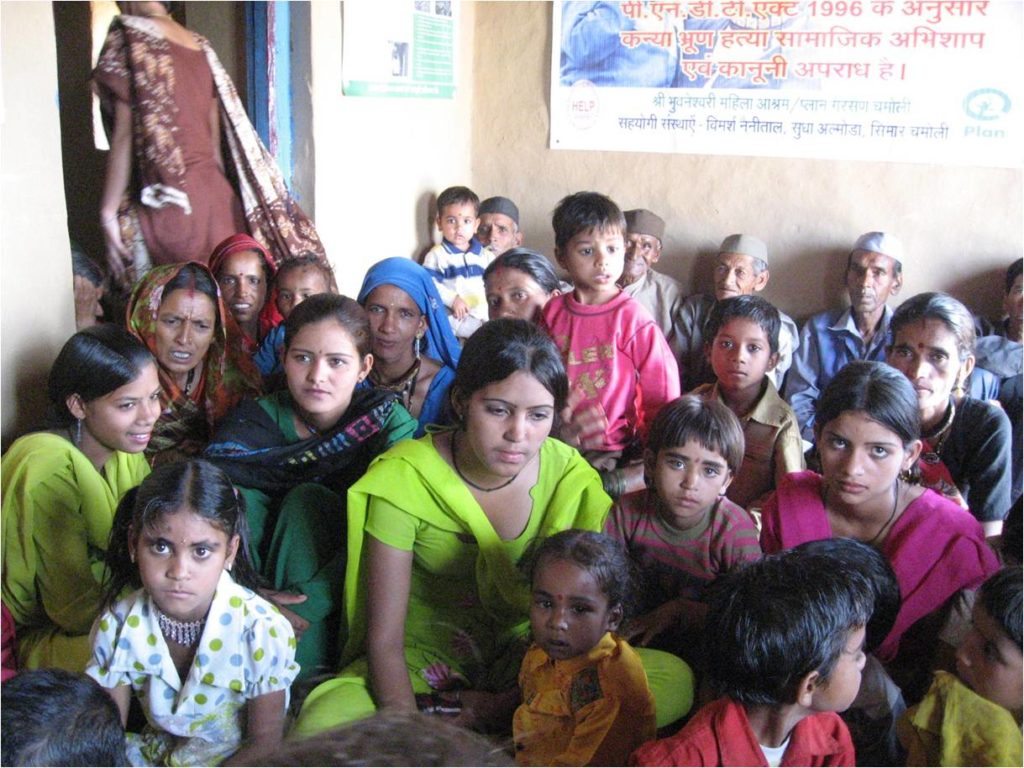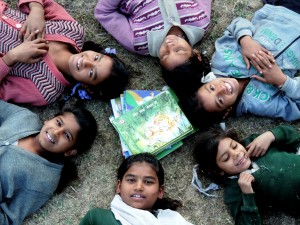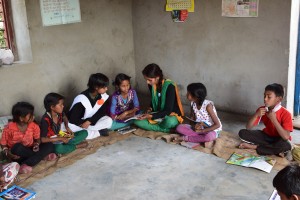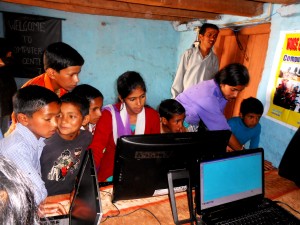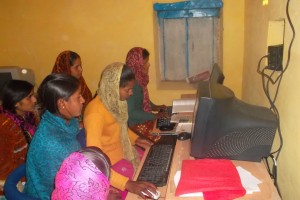Click here to read the latest Voice of Children half-yearly progress report from June 2018.
Voice of Children (VOC) is run by Aman and Vimarsh, two local Indian NGOs in the Almora and Nainital Districts in the hills of northern India (see #2 on the TRAS projects map). TRAS started working with them in late 2009 on a one-year pilot project funding educational projects in five villages. Within a year, amazed at what Voice of Children accomplished, TRAS agreed to partner with them for a longer period and support projects in more villages. There are now 12 villages – 7 supported by Aman and 5 supported by Vimarsh.
Each NGO has a small staff of highly dedicated workers earning a minimal wage and a team of local volunteers determined to improve conditions for people in villages. Their work covers many aspects of village life (agriculture, restoration of drinking water supply, community development, women empowerment, formation and strengthening of self-help groups, disaster preparedness, etc) besides the TRAS Voice of Children project.
The villages lie anywhere from 2km to 27km from nearest roads. All supplies are carried in and out on foot or by donkeys on trails. Village schools have often been closed because of the difficulty of finding staff to stay. (Village schools have often only one or two teachers. The majority of the teachers want to work close to urban centres. There is a shortage of trained teachers and this contributes very much towards deteriorating quality of education in Government primary schools). Getting to a secondary school is a near impossibility for youth in the most remote villages. With no regular health services, health problems are rampant. Apart from a little farming and animal husbandry, income generation is non-existent. Men often leave to find work in cities, leaving the women and children behind.
The aim of the Voice of Children project is to advocate for the rights of children, which are enshrined in state and national constitutions. Aman and Vimarsh do not want to build schools or health centres, but rather their objective is to empower the villagers to seek what is due to them by teaching them an awareness of their rights and of the value of education and encouraging them to act on behalf of their children. 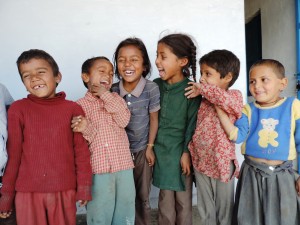
Accomplishments since 2009:
Education and Health Projects
- Early childhood education centres (Balwadi) for 3 – 5 year olds are currently established in 6 villages. Children learn early literacy skills in Hindi and English. Balwadis are run by village young adults whom Voice of Children trains.
The good news is that thanks to support from Voice of Children, local women have demanded that local governments fulfill their obligations, and two other centres have been taken over by the government and are running successfully.
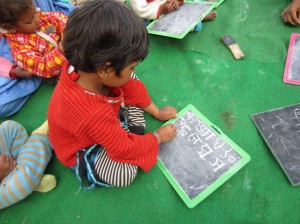
- Educational Support Centres for school-aged children (Bal Sangthan) are currently established in 5 of Aman’s villages. Volunteer teachers trained by Voice of Children staff plan an individualized program for each of the 125 children. They spend two hours at their centre each school day. Children improve their educational base in Hindi, English, Science, Mathematics, Social Studies and General Knowledge
- In the first few years, Aman also ran Bridging Courses to help the many children who had completely dropped out of school, often due to lack of parental support for education. Many children were re-integrated into the regular school system through the advocacy of the Aman staff and the Bridging Courses. Those who had dropped out and who wished to return to school found that not only were they behind in their studies, but they were often ignored when they returned to school. The Bridging Courses helped them catch up, and more importantly gave them and their parents the necessary support to ensure success in school. Now so few drop out that they are accommodated in the Educational Support Centres.
- Tuition centres are run in 5 of Vimarsh’s villages to help 97 children keep up with their studies. All 5 villages are situated in very remote areas, and the Tuition Centres are a good opportunity for the children to strengthen their learning and to reduce the dropout rate. In 2015 Vimarsh appointed 5 new teachers – they were selected by the local women’s groups – and all five had been members of the VOC Children’s Groups.
- Fellowship programs help Aman students with school supplies, fees, uniforms and shoes, to make it easier for them to stay in school. In 2015 27 children were helped, according to need. Vimarsh helped 5 school children and was also able to assist 15 university students with their fees –a first!
- An unexpected benefit, gained through the advocacy of Voice of Children staff, is the support of the district education officer, who has ordered each school in the region to provide education to all children age 6 to 14 years.
- Education Centres for Women In the beginning, women’s literacy classes were held in an almost clandestine manner, as the women felt their husbands would not allow them to learn. Now the classes are held openly and regularly, and children are helping to teach them, through the ‘each one teach one’ campaign. 18 more women became literate in 2015.
- Computer Literacy Classes At the urgent request of the children, VOC has used the funds previously needed for early childhood education to start computer classes. In these remote villages computer accessibility is a dream come true. 109 children are now able to access, collate and organize information from different sources in the world and to increase their knowledge. Aman hired a teacher who gave two six-month courses to a total of 43 children and youth. Vimarsh villages were too scattered for children to walk to courses – so a young woman (currently studying for her bachelor’s degree through remote learning) arranged a ‘mobile computer course’, walking to one village for three months, and then to the next. 66 children benefited.
- Extracurricular activities in 11 villages include a children’s newspaper, educational tours for older children, children’s groups, an annual children’s fair (Bal Mela) in each area, catering to a total of 369 children. In the Aman area, 172 children belong to the children’s groups; they hold monthly meetings and learn about child rights, gender discrimination, the Child Help Line, environmental issues and they initiated a drive about clean water sources. In the Vimarsh area, 8 cluster meetings were held of the various groups, with 75 children participating. These meetings played an important role in helping the children to make their own plans for the fair, the computer training timings and environmental work. They planted 72 saplings and helped to clean water sources.
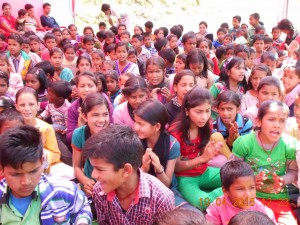
- Women’s Groups (Mahila Sangthan) In 2015 a total of 69 meetings were held in the Aman project villages on such subjects as women’s health, literacy, computer training, general hygiene, organization building, school management, the Right To Education Act, government schemes for women and women’s participation in local governance meetings. In the Vimarsh villages monthly meetings covered domestic violence, gender discrimination, Right to Education Act, local self -governance, and the government scheme supporting girl education. Four collective meetings were held on the leadership role of women in school management and local governance. 392 women participated.
- Adolescent Girls’ Groups continue to meet regularly. Led by young women from the villages, adolescent girls learn about adolescent girls’ health, female foeticide, sexual health, hygiene, the Right to Education Act, and girls’ rights.
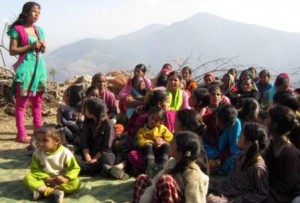
- Vocational Training A one-month tailoring course was organized by Aman for 15 young women. Four young women, ex-members of the children’s groups, were selected for a hotel worker’s training, and three now have jobs in nearby towns. Since then, VOC has joined the TRAS Scholarship Fund project and has selected eight students to attend university.
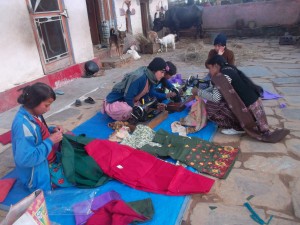
- Capacity Building for staff and volunteers Monthly meetings enhance the execution of the VOC programs. Three trainings were given to the teachers on developing child-friendly learning materials and centres. At a joint meeting, staff from Aman and Vimarsh were able to share their experiences, challenges and future strategy for better implementation of the program.
Some recent outcomes include:
- Active participation by women in local self- governance meetings (previously only men attended).
- 85 women held meetings with their block development officers to discuss development work in their villages.
- The Vimarsh women’s groups met with the District Magistrate to demand road construction and a road survey has begun.
- In both areas women participated in school management meetings to bring awareness on children education issues.
- Women’s groups have raised the issues of gender violence and female foeticide.
- Women from the Aman area were selected to participate in the State Education Consultation and represented their village education status.
Funds needed for 2019: $28,250
Videos
Watch the video Three TRAS Projects that includes Voice of Children’s story.

